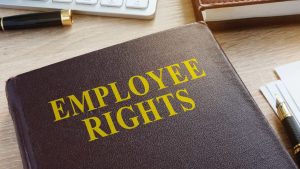Table of Contents
ToggleHave you ever wondered how long gross misconduct stays on your record and what impact it could have on your career? Facing allegations of gross misconduct is one of the most challenging situations an employee can encounter, often leading to immediate dismissal and long-lasting consequences.
But how long does it really affect your employment record, and what can you do to address it? Understanding the policies, legal frameworks, and your rights as an employee in the UK is crucial.
This article will explore the key aspects of gross misconduct, its implications, and practical steps to move forward after such an experience. Let’s uncover the answers to these pressing questions.
What is Gross Misconduct?

Gross misconduct refers to serious or extreme behaviour that fundamentally breaches the trust and confidence between an employee and employer.
It is one of the most severe forms of workplace misconduct, often resulting in immediate dismissal without notice or pay in lieu of notice (commonly referred to as summary dismissal).
Examples of Gross Misconduct
The exact definition and examples of gross misconduct can vary depending on an organisation’s policies. However, some common examples include:
- Theft or fraud within the workplace.
- Physical violence or threats directed at colleagues or clients.
- Harassment or discriminatory behaviour.
- Serious breaches of health and safety regulations.
- Being under the influence of drugs or alcohol while performing duties.
- Damage to company property or resources.
Implications of Being Found Guilty of Gross Misconduct
When an employee is accused of gross misconduct, the employer may initiate a formal disciplinary process. If proven, the employee is usually dismissed immediately, and this may be recorded on their employment record. Such records can affect future employment prospects if referenced during job applications or employment checks.
Employers are obligated to investigate the situation thoroughly to ensure fairness and compliance with UK employment law. This includes offering the accused a chance to present their side of the story before a final decision is made.
How Long Does Gross Misconduct Stay on Your Record?
The duration for which gross misconduct stays on your record can vary depending on the policies of the employer, the nature of the misconduct, and relevant data protection regulations. In the UK, there is no fixed legal timeframe for how long an employer may retain records related to disciplinary actions.
Employer Policies on Record Retention
Most employers maintain disciplinary records, including instances of gross misconduct, as part of their internal documentation. These records are often stored for several years, with common timeframes being:
- 1 to 6 years for general misconduct or disciplinary records.
- Longer periods or indefinitely for severe cases, especially those involving legal consequences.
The Impact of GDPR and the Data Protection Act 2018
Under the General Data Protection Regulation (GDPR) and the Data Protection Act 2018, employers must handle personal data, including disciplinary records, responsibly. They are required to:
- Retain records only for as long as necessary.
- Justify the need to store data beyond a reasonable timeframe.
- Allow employees to request data removal or correction if it is inaccurate or unnecessary.
Other Influencing Factors
- Employer Practices: Some organisations may automatically erase records after a fixed duration, while others may retain them indefinitely.
- Nature of the Misconduct: Serious offences like fraud or physical violence may remain on file longer than less severe issues.
Employees concerned about the duration of a gross misconduct record can seek clarification from their employer’s HR department or review the company’s data retention policy. Understanding your rights under UK law ensures you remain informed about your employment record.
Does Gross Misconduct Affect Your Employment References?

Gross misconduct can significantly influence the type of employment references you receive from a previous employer. In the UK, while employers are not legally obligated to provide a reference, any information they do share must be accurate, fair, and not misleading.
How Employers Handle References After Gross Misconduct?
- Neutral References: Some employers may only confirm basic details, such as job title and employment dates, to avoid legal risks.
- Detailed References: If an employer provides detailed references, they may disclose gross misconduct if it is deemed relevant to the role you’re applying for.
- Agreed References: In certain cases, as part of a settlement, employers and employees agree on what the reference will include to ensure fairness.
Your Rights as a Former Employee
- You can request a copy of the reference under GDPR to ensure accuracy.
- If inaccurate information is shared, you have the right to challenge it legally.
- Employers are encouraged to avoid including subjective or unsubstantiated claims.
Gross misconduct does not automatically prevent future employment, but understanding how it impacts references can help you navigate applications more effectively.
Can You Have Gross Misconduct Removed from Your Record?
Removing gross misconduct from your employment record is challenging but not impossible. Whether it can be removed depends on the company’s policies and the circumstances surrounding the case.
Steps to Challenge or Remove Gross Misconduct
- Appealing the Decision: If you believe the gross misconduct claim was unfair, you can appeal through the employer’s internal grievance or appeal process. Presenting evidence to counter the allegations is crucial.
- Requesting Record Removal: Under GDPR, you can request that the record be deleted if it is no longer relevant or necessary, provided it complies with the employer’s data retention policies.
- Right to be Forgotten: In severe cases, employees may exercise their “right to be forgotten” to remove data stored by employers, especially if it impacts their career unfairly.
Key Considerations
- Employers may retain disciplinary records for legal or compliance reasons.
- Seeking advice from legal professionals or employment solicitors can improve your chances of resolving disputes.
While gross misconduct can significantly impact your career, knowing your rights and taking appropriate actions can help mitigate its effects.
Legal Protections and Employee Rights

In the UK, employees are protected by a robust framework of laws designed to ensure fair treatment during dismissal processes, including cases involving gross misconduct. Understanding these rights can help employees defend themselves and seek justice if treated unfairly.
Key Legal Protections
- Fair Dismissal Process: Employers are required to follow a fair and transparent procedure when dismissing an employee. This includes conducting a proper investigation and providing the employee with an opportunity to respond to allegations.
- Right to Appeal: Employees have the right to challenge the decision through an internal appeal process if they believe the dismissal was unjust or procedurally flawed.
- Protection Against Unfair Dismissal: Under the Employment Rights Act 1996, employees with at least two years of continuous service can file a claim for unfair dismissal if they believe the decision was unreasonable or biased.
Steps Employees Can Take
- Request a written explanation for the dismissal to understand the employer’s reasoning.
- Seek advice from employment solicitors or legal professionals.
- If necessary, file a claim with an employment tribunal to contest the dismissal.
Employer Compliance Obligations
Employers must act in accordance with UK employment law and cannot use gross misconduct as a pretext for unfair or discriminatory practices. This ensures employees are treated with fairness and respect throughout the process.
Practical Tips for Moving Forward After Gross Misconduct
Facing the repercussions of gross misconduct can feel overwhelming, but taking proactive steps can help you rebuild your career and professional reputation. It’s essential to approach this period with a plan and a positive mindset.
Steps to Rebuild Your Career
1. Seek Professional Advice
- Consult an employment solicitor or legal professional to understand your rights and options.
- Discuss strategies for addressing gross misconduct in future job applications.
2. Focus on Skills Development
- Enrol in training courses or certifications to enhance your skills and demonstrate personal growth.
- Volunteering or freelance work can help bridge employment gaps and showcase your capabilities.
3. Be Transparent in Job Applications
- Avoid dishonesty about your dismissal; focus on explaining what you’ve learned from the experience.
- Highlight your strengths and achievements to offset concerns about past incidents.
4. Network Professionally
- Reconnect with former colleagues or mentors who can vouch for your character and abilities.
- Leverage platforms like LinkedIn to find opportunities and build connections.
5. Restoring Your Confidence
The impact of gross misconduct can be emotional as well as professional. Taking time to reflect, seek support, and plan for the future can help you regain confidence and move forward.
If handled strategically, this setback can become an opportunity to demonstrate resilience and growth to prospective employers.
Conclusion
Gross misconduct is a serious matter that can impact your professional reputation and future employment opportunities. While the duration it remains on your record varies, understanding your rights under UK law and employer policies is crucial.
By leveraging your legal protections, such as the right to appeal or request record removal under GDPR, you can take steps to address the issue.
Rebuilding after gross misconduct may be challenging, but with transparency, skills development, and networking, it’s possible to recover and advance your career.
Remember, setbacks like these can be opportunities for growth and resilience. Equip yourself with knowledge and take proactive steps toward a brighter professional future.
FAQ
What is considered gross misconduct in the workplace?
Gross misconduct refers to actions that severely breach the trust and confidence between an employer and employee. Examples include theft, physical violence, harassment, or serious breaches of company policies.
How does gross misconduct affect future employment opportunities?
Dismissal for gross misconduct may influence your references, potentially raising concerns with future employers. However, being transparent and focusing on growth can help mitigate its impact.
Can an employer legally disclose gross misconduct in a reference?
Yes, employers can disclose gross misconduct if it is accurate, fair, and relevant to the new role. However, they are not obligated to provide detailed references.
Is there a time limit for how long gross misconduct stays on record?
There is no fixed legal timeframe. It depends on employer policies, but records are usually retained for several years or longer for serious cases.
Can gross misconduct be challenged after dismissal?
Yes, you can appeal the decision through your employer’s grievance process or pursue a claim of unfair dismissal through an employment tribunal.
Does gross misconduct show up in criminal background checks?
No, gross misconduct is an employment matter and does not appear on criminal records unless it involves illegal activity leading to a conviction.
How can I recover professionally after gross misconduct?
Focus on improving skills, networking, and being honest about past mistakes. Seeking professional advice can also help you navigate applications effectively.




